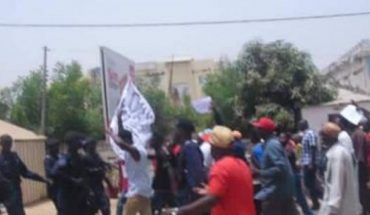In the past days, hundreds of Gambians have gone out on the streets calling for the authoritarian state to undergo democratic political reforms ahead of presidential election set for December.
The authoritarian regime of this tiny country located inside Senegal is well-known for cracking down on any attempt to protest, and these recent demonstrations are the largest that the Gambia has seen since 2000. One protester told us why she decided to take part in these historic demonstrations, despite the risks.
The protests began on April 14. Demonstrators want the government to enact political reforms before the presidential election, set for December. The president, Yahya Jammeh, who has been in power since a coup d’etat in 1994, is running for his fifth term in office. Opponents say that the president wants to make sure that the results of this election are predetermined. They point to many recent decisions as proof. First, a politician close to the president was recently chosen to head the electoral commission responsible for organising the elections. But that’s not all. Activists also decry the decision to increase by tenfold the fee for running a candidate – it now costs 500,000 dalasis, which is roughly equal to 10,000 euros.
Several leading activists were arrested on Thursday, the first day of the protests.
One of them was Solo Sandeng, the National Organising Secretary of the opposition United Democratic Party (UDP). He died in detention on Friday, according to Amnesty International. The circumstances of his death are as yet unknown. The news of the deaths of Sandeng and two other activists added fuel to the fire of the protests, angering protesters and ratcheting up the violence during clashes with the police.
Our Observers managed to send us rare videos of the clashes.
“For the first time in my life, I saw Gambians resisting soldiers”

Aminata (not her real name) is a young activist who took part in the protests.
I didn’t take part in the first protests on Thursday but, when I learned that many people had been arrested, I decided to take to the streets as well. Our right to protest is supposed to be guaranteed under the constitution [Editor’s note: Under article 25 of the Gambian Constitution], but now we have proof that the authorities don’t respect our basic liberties.
On Saturday, we were marching peacefully, arm-in-arm. Very quickly, the police came and barred our way and tried to disperse us. One soldier hit me, which sparked scuffles among activists and security forces. Warning shots were fired.

Yet, for the first time in my life, I saw people standing up to the soldiers.
“I heard people say: ‘You should be protecting us, not attacking us'”
This might sound incredible when you know that we aren’t even allowed to film policemen with our mobile phones [Editor’s note: In March 2015, a young Gambian activist was forced into exile after filming an instance of police violence and posting it on WhatsApp. Had she stayed in the Gambia, she might have been given up to 15 years in prison for “sharing false information” about an employee of the Gambian government].
The protesters are sensing that the party in power is positing itself for another power grab in the December presidential elections. It’s as if we reached the point of no return after too many years of staying silent. We know that we could pay very dearly for protesting and that we are risking our lives by doing so. However, after several days of protest, the activists remain united. It might be a sign that something is changing.

Several political groups and activists called for protests to resume on Monday. However, several of our Observers in Banjul said that a large police presence had kept protesters from taking to the streets at noon as planned.
“They only went 300 metres, but even that was a victory”


